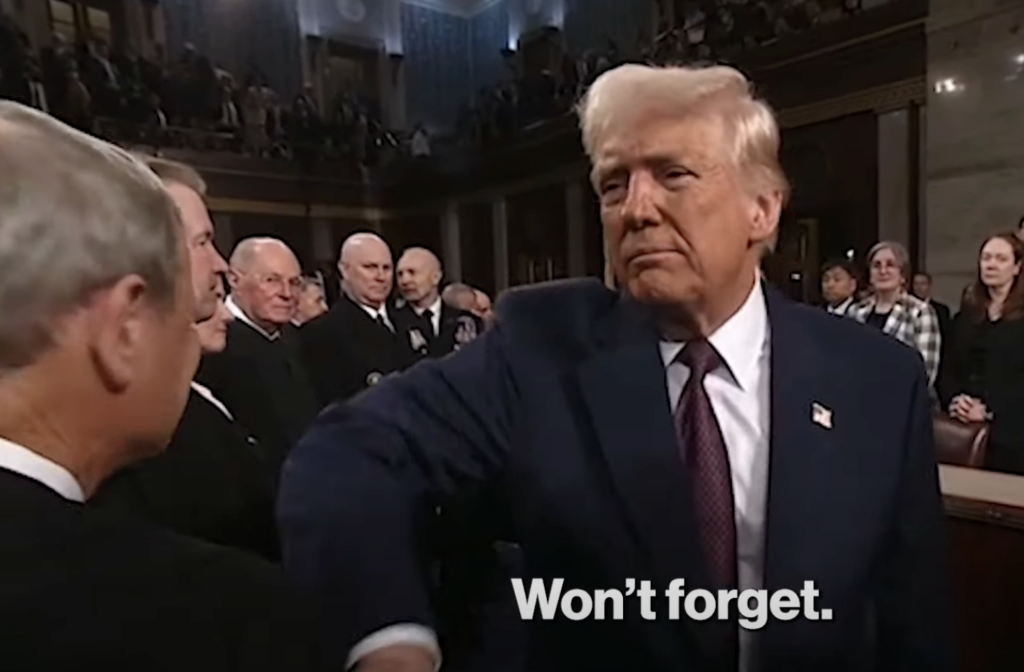Collaborators in usurpation

Kate Shaw does a very good job of explaining that there’s not going to be a big showdown between Trump and the Supreme Court because the Court strongly supports Trump’s extraconstitutional actions:
I think things look worse for the rule of law and better for Trump’s dictatorial aspirations now than they did three or four months ago.
So I think it’s right that in the first couple of months of the administration, Trump was making these wildly broad assertions of executive authority and executive orders and other kinds of actions, and he was running into the kind of buzz saw of the lower courts applying settled doctrine, reading the Constitution and statutes, and saying: No, you can’t do that. That’s not how any of this works.
That is still ongoing. But beginning in about April, the Supreme Court started to get into the mix. In a series of rulings — actually 16 in a row — the Supreme Court has sided with Trump and against challenges to Trump and against lower courts that have ruled against Trump, in this wild streak of victories for Trump that have largely happened under the radar because they’re happening on the shadow docket.
[…]
Largely, Trump has prevailed in these efforts. Now the court hasn’t, on the merits, actually grappled with some of these questions. The statutes that provide civil service protections are still on the books, and the Supreme Court has not in any way said those laws are unconstitutional, even though I think it’s pretty clear that Trump and many of his advisers think that’s the case.
In some of those memos or emails that you just referenced, the reason for termination that is given is literally two words: Article II — that the president’s power under Article II entitles him to fire anyone. I do think they think that.
So the court has addressed a number of cases involving these terminations, some of them high-level officials — people like one of the members of the National Labor Relations Board or the Merit Systems Protection Board. Statutes give those officials protection against being fired just because the president feels like it or wants to put somebody else in the position.
Trump, in clear facial violations of those statutes, fired those people. And actually, this case involving the N.L.R.B. and M.S.P.B. members made it to the Supreme Court on the shadow docket, and we did get a short written opinion there that basically said: These officials exercise significant executive authority, and so the president has to be able to fire them at will.
I think that reasoning is wrong, but at least it’s there. So we know the court thinks it will ultimately decide this probably next term but thinks that these heads of multimember agencies, Trump can fire anytime he wants, regardless of what statutes say.
And let’s also be frank about what would have happened had Joe Biden tried to do anything like this:
I remember when Barack Obama wanted to restructure the Commerce Department, and Congress wasn’t interested, so he couldn’t do it.
What has happened there?
Imagine Barack Obama deciding to just abolish by executive order the Commerce Department. Or Joe Biden saying: We’re going to get rid of ICE.
The idea that he would just by fiat fire everyone in these agencies — and that the court would allow it — is kind of preposterous. I don’t think there’s any way that the Supreme Court would have allowed a different president to proceed as this president is proceeding — which isn’t the question you asked, but I do think that that’s worth saying.
People who are trying to persuade the Court by doing “but what happens when President Ocasio-Cortez gets all of these powers” are well-meaning, but the problem is that she wouldn’t. And when most of your expansions of executive power happen through unreasoned orders, you don’t even have to explain yourself.


